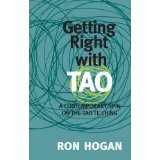Ron Hogan on the Best Novels for Writers

Novelists learn how to write fiction by reading it. But what are the best novels for learning about the craft? We asked author Ron Hogan for some recommendations.
Ron Hogan is the founder of the seminal literary blog, Beatrice.com and has previously worked as a senior editor at GalleyCat and as the director of e-marketing strategy for Houghton Mifflin Harcourt. He is the author of the books Getting Right with Tao: A Contemporary Spin on the Tao Te Ching and The Stewardess Is Flying the Plane. He is also a contributor to the New York Times bestseller Not Quite What I Was Planning and the critical anthology Secrets of the Lost Symbol.
A Conversation with Ron Hogan
Q: Could you recommend a novel with characters that felt particularly real to you or which made you care about the story?
A: This is an area where the best romance writers really shine -- as a genre, romance plots can tend towards a set of "expected" events, and in those cases the emotional authenticity of the characters and their reactions to the situations in which they find themselves can make all the difference. Eloisa James is particularly excellent in this regard, in everything of hers that I've read so far; I was also tremendously impressed recently by Victoria Dahl's A Little Bit Wild.
"For the most part, you can't separate out character strength and plot strength -- if you don't care about the people involved one way or the other, you aren't going to be interested in what they're going through."
- Ron Hogan on the Best Novels for Writers
Q: Could you recommend a novel that you think is an example of effective plot development and pacing?
A: For the most part, you can't separate out character strength and plot strength -- if you don't care about the people involved one way or the other, you aren't going to be interested in what they're going through. There are only a handful of absolutely breakneck plots that can get away with being stronger than the characters; Dan Brown's The Lost Symbol is a particularly well-known example of that. The trick to making that book work is the way Dan Brown just keeps throwing plot (and the nonfictional argument disguised as dialogue and exposition) at the reader without ever pausing and giving readers the opportunity to recognize that most of the actors are all stock figures and/or compilations of character traits rather than characters.
But there can only be a handful of Dan Brown-like authors at any given time, so your best bet is probably to start with compelling characters and then put them into a situation and see how they react to it.
Q: What's an example of a great beginning to a novel?
A: The most memorable opening I've read recently was probably in Paul Murray's Skippy Dies. The first chapter delivers exactly what the title promises: You meet a character named Skippy, and mere pages later he's dead. And not only is it funny and tragic at the same time, it makes you want to keep reading, first to find out who he was, and then to find out what happens after he dies.
Q: (Without giving the ending away), could you recommend a novel with a particularly satisfying ending?
A: Well, these aren't ENDINGS so much as they are climaxes, after which there's still some Act 5 denouement to read through, but China Mieville's Kraken and the recent reissue of Thomas M. Disch's The Priest are two great examples of stories that have several narrative threads that converge in ways that feel unforced and natural, but still engrossingly dramatic.
Q: Could you recommend a novel where the author has successfully done something innovative with form or genre?
A: I was greatly impressed with James Ellroy's original LA Quartet when I first read it in the 1990s; from The Black Dahlia to White Jazz, you could literally see his voice radically mutating from one book to the next. Recently, I've been delighted by the short-story anthology Machine of Death, a collection in which several dozen authors offer their take on the concept of a machine that tells you how (but notwhen) you'll die, usually in an oblique and ironic manner. The stories range from bleak to disturbing to hilarious; one story is even exuberant, if you can believe it.
Q: Could you recommend some wonderful novels or story collections that are not as well-known as they should be?
A: Oh, we could be here forever if I started doing that. But there are a number of smaller independent presses that have been publishing excellent fiction at a respectably consistent rate, so if you keep your eye on Graywolf Press, or Unbridled Books, or Other Press, or Europa Editions, you're bound to come across several interesting things. Those are just the first four that come to mind; I feel like I'm leaving out a bunch of others.
Best Novels - Next Steps
Did you enjoy this interview about the best novels for writers? Also check out Edward Champion's best novelschoices and Jonathan Mayhew's reading recommendations for poets.
Visit our How to Write a Novel section.
Return from Best Novels to the Creative Writing Ideas Blog.
<< BACK from Best Novels to the Creative Writing Topics Home